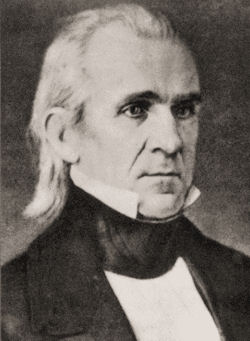James K. Polk (1845-1849)
 James Knox Polk was born in 1795 in North Carolina. He narrowly won election to the presidency over Henry Clay in 1844 at the age of 49, making him the youngest president to that date. Polk entered the presidency with a clear plan of action rooted in westward expansion. Seen by contemporaries as conscientious and attentive to the needs of the country, in his presidential campaign he promised not to run for a second term. True to his word, he did not.
James Knox Polk was born in 1795 in North Carolina. He narrowly won election to the presidency over Henry Clay in 1844 at the age of 49, making him the youngest president to that date. Polk entered the presidency with a clear plan of action rooted in westward expansion. Seen by contemporaries as conscientious and attentive to the needs of the country, in his presidential campaign he promised not to run for a second term. True to his word, he did not.
The family moved to the Columbia, Tennessee area in 1806. His father Samuel Polk built a new house in Columbia 10 years later as a symbol of his success as a farmer. James lived there as a young man for several years. Polk graduated from the University of North Carolina in 1818 and read law in Nashville for a year although he still called his family's house home. After passing the bar, Polk returned to Columbia to this house, opened his own practice, and quickly achieved success. He rapidly rose through the ranks of government, serving in the United States House of Representatives from 1825 until his election as governor of Tennessee in 1839. He was Speaker of the House from 1835-1839 and was an unfailing supporter of Andrew Jackson.
Polk was the first “dark horse” presidential candidate. Originally considered only as a possible nominee for vice president, Polk became the Democratic presidential candidate as the result of a deadlock among Martin Van Buren, Lewis Cass, and James Buchanan. The virtually unknown Polk surprised the nation by winning the close election of 1844 with his popular position favoring the annexation of Texas and acquiring the Oregon territory from Britain.
A Democrat, he sought the presidency in 1844 on a simple platform: the annexation of Texas and the occupation of Oregon. The Tyler administration took care of acquiring Texas before Polk was sworn into office, but he persisted in an aggressive agenda of American expansion. Polk campaigned under the popular slogan "54-40 or fight," a contention that the southern boundary of Russian America was the northern boundary of Oregon. He pressed through diplomatic channels and used his inaugural address to assert American rights to all of Oregon. His ambitions far exceeded the area of American activity.
Winning by a narrow margin, Polk campaigned on his strong support for westward expansion, a hotly debated issue that was dodged by other candidates. After taking office, Polk acted swiftly to fulfill his campaign promises, as he intended to serve only one term. In four years, he oversaw the addition of Texas, the reestablishment of an independent treasury system, and the acquisition of territory from Mexico. This new land from Mexico eventually became California, New Mexico, Arizona, Utah, and parts of Colorado and Wyoming.
Oregon became a sidebar in the unfolding story of the Mexican War. While Congress was willing to plunge the country into a war against its neighbor to the south, it was opposed to entering a conflict with Great Britain. That nation, beset with internal disputes over Corn Law reform, was likewise eager to reach a settlement. Thus in 1846 the two countries agreed to extend the boundary on the 49th parallel westward from the crest of the Rockies to the primary channel between Vancouver Island and the continent.
During Polk's term of office, the country acquired over 800,000 square miles of western territory. With the acquisition of this land, the continental United States reached approximately its present extent. Although he had hoped to complete the annexation of Texas peaceably, Polk ultimately ended up seeking a congressional declaration of war in 1846. At the end of the Mexican War in 1848, the United States gained most of what is now the southwestern United States, including Texas, New Mexico, and California. Polk agreed to a negotiated northern boundary for Oregon, ending years of disputes with Great Britain. Debates about organizing the new territories added fuel to the already bitter disputes over the extension of slavery, however, and helped split Polk’s Democratic Party into pro- and anti-slavery wings.
At 49 years of age, Polk was the youngest president inaugurated up to that time, but the strain of his campaign and of his presidency left him exhausted. Full of enthusiasm and vigor when he entered office, Polk left the White House at the age of 53, exhausted. True to his campaign pledge to serve only one term, Polk left office and returned to Tennessee in March 1849. Polk died of cholera three months later, as thousands of Americans rushed west in search of California gold.
|
NEWSLETTER
|
| Join the GlobalSecurity.org mailing list |
|
|
|

